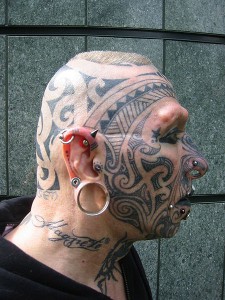
POTENTIAL servicemen are being barred from the armed forces by bosses concerned about their unsightly tattoos and body piercings.
Hundreds of would-be recruits have been turned down because military chiefs are taking an increasingly dim view of the body art.
In the last three years, the Navy has turned away 417 aspiring sailors because they deem their adornments to be unsuitable.
In the same period, the RAF vetoed 453 applications.
In the previous three years, just 12 applications were blocked for the same reasons.
However Army bosses appear to have a more relaxed view on body are, with only nine recruits being dropped in the last five years.
Almost a third of Britons aged between 16-and 44 sports a tattoo and thousands more have piercings, potentially barring thousands from military service if bosses continue to turn down applicants with body modifications.
Barry Crake, a micro-pigmentation technician who runs a charity which offers free tattoo removal to people unable to find work because of tattoos on their head, neck and hands says the figures are just the tip of the iceberg.
He said: “I originally set up the Human Life Trust to help victims of domestic abuse with scar removal.
“But now I get far more calls and emails from aspiring servicemen and woman who have been rejected because of their tattoos.
“We’ve been inundated with more than 200 of these enquiries in the last six months alone.”
He added: “Just because someone has made an error of judgement at one point shouldn’t mean they are outcasts for the rest of their lives.”
Armed forces guidelines say applicants can be rejected if they have tattoos which are racist, anti-religious, crude, sexist, of an extreme political nature or if they are too large.
Tattoos on the head and neck are also prohibited and hand and wrist tattoos “may be a bar to entry” depending on the message they give out.
Knuckle tattoos including “hate” and “war” are deemed unacceptable but names of loved ones are allowed, as well as inoffensive motifs such as birds and butterflies.
Piercings are banned in the wearer refuses to remove them before taking part in physical activities.
Stuart Crawford, a former lieutenant colonel with the Royal Tank regiment said: “ The Ministry of Defence rules are quite reasonable. But there is the danger of throwing the baby out with the bath water here.
“I’m not sure an otherwise outstanding recruit should be ruled out because they have a small but visible tattoo.”
An MoD spokesman said: “The policy on tattoos and piercings is representative of the high standards expected of service men and women. Services require their personnel to have a bearing that is neat, restrained and discreet, when in uniform.”

